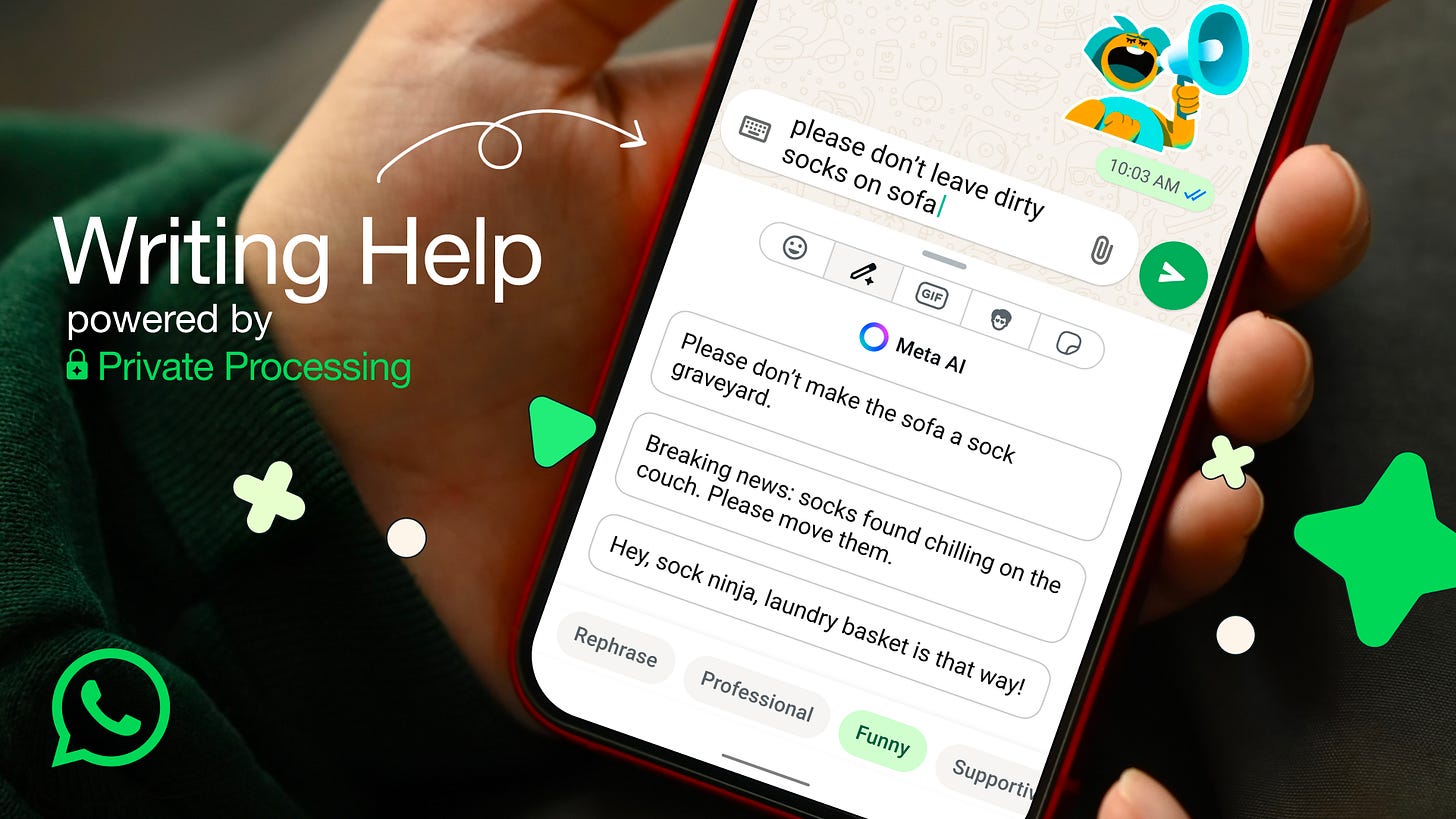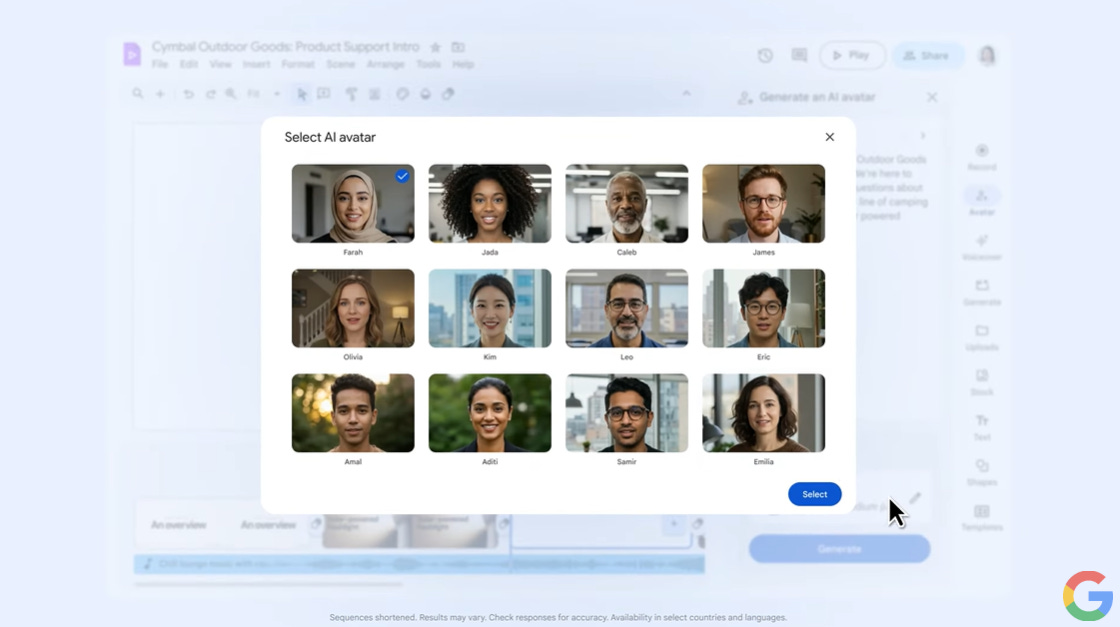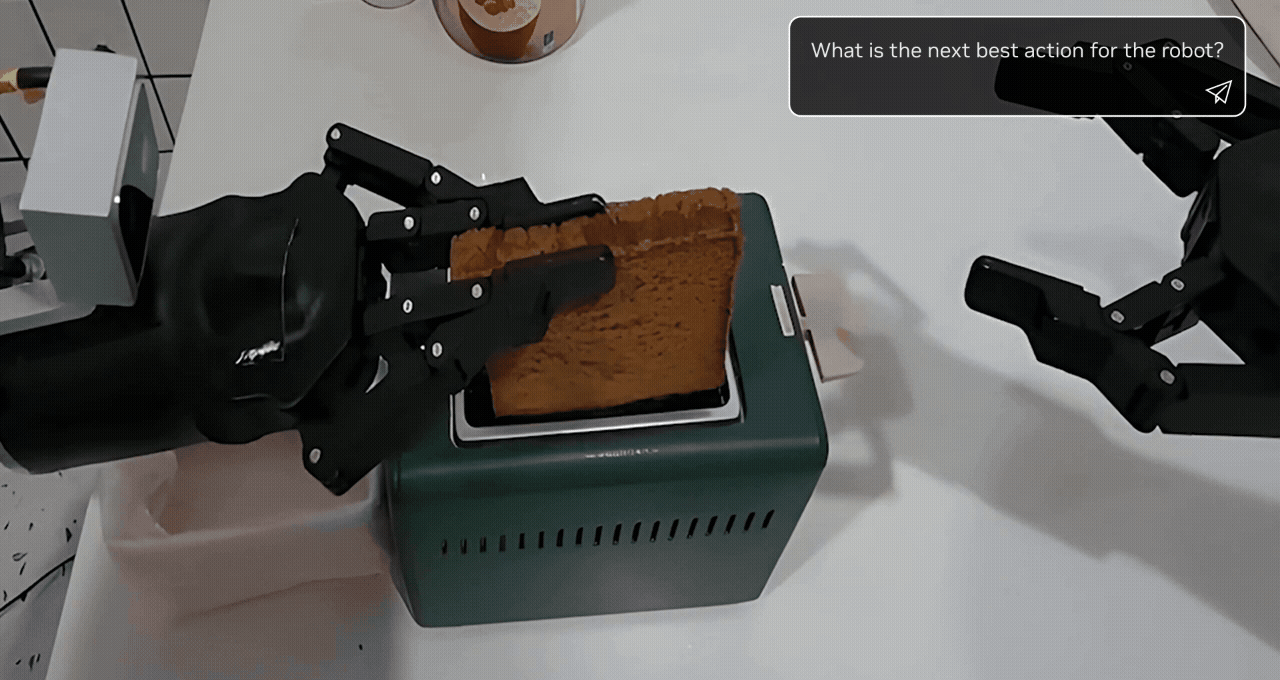AI Avatars Transform Google Vids Experience
Along with “Vibe-Hacking” Weaponizes Claude AI
TLDR; In today’s Signal
WhatsApp Introduces Private Writing Help for Messages
Samsung TVs & Monitors Get Copilot AI
OpenAI & Anthropic Join Forces on Safety
Gemini 2.5 Flash Image Arrives on Vertex AI
NVIDIA Teaches AI Physical Common Sense
AI-Powered Ransomware Emerges as Major Threat
Namibox to Launch AI-Powered Learning Glasses
Young Workers Hit Hard by AI Surge
THE AI SIGNAL PICKS
WhatsApp Introduces Private Writing Help for Messages
WhatsApp has launched Private Writing Help, a new AI-powered tool that assists users in crafting messages with the right tone. Whether it’s professional, casual, or empathetic, the feature helps people express themselves clearly while staying true to intent. This move underscores WhatsApp’s push to blend personalization with privacy in communication.
Samsung TVs & Monitors Get Copilot AI
Samsung has integrated Microsoft’s Copilot AI into its 2025 lineup of TVs and smart monitors, bringing a friendly, animated assistant right to your screen. Accessible via voice or remote on Tizen OS homescreen, Samsung Daily +, and Click to Search, Copilot offers personalized guidance on movies, weather, questions, and more enhanced by Vision AI for smarter, context-aware assistance.OpenAI & Anthropic Join Forces on Safety
OpenAI and Anthropic have completed the first-ever cross-evaluation of each other’s frontier models, including Claude Opus 4, Claude Sonnet 4, GPT-4o, GPT-4.1, o3, and o4-mini. The joint study probed misalignment risks such as hallucinations, sycophancy, misuse, and self-preservation. Results show trade-offs across systems, with reasoning-centric models like OpenAI’s o3 scoring better on safety benchmarks.Gemini 2.5 Flash Image Arrives on Vertex AI
Google’s Gemini 2.5 Flash Image, a state-of-the-art image generation and editing model, is now available in preview through Vertex AI. It delivers seamless creative workflows like multi-image fusion, character consistency, and natural language editing with built-in SynthID watermarking for transparency. This launch marks a major step in providing enterprises with powerful, easy-to-integrate generative AI capabilities.AI-Powered Ransomware Emerges as Major Threat
Generative AI is now aiding cybercrime: attackers are leveraging Anthropic’s Claude, Claude Code, and other local LLMs to develop ransomware including drafting extortion notes, building malware, and automating attacks. Security firm ESET has also identified “PromptLock,” the first AI-powered ransomware prototype using local language models to dynamically generate malicious scripts. This marks a pivotal shift—lowering technical barriers and enabling complex cyberattacks across broader threat actors.
THE BIG LEAP
AI Avatars Transform Google Vids Experience
Signal Scoop: Google has rolled out AI Avatars in Google Vids, letting users “write a script and choose an avatar” to instantly generate narrated video clips without cameras, filming, or presenters. With 12 preset avatars and voices, teams can quickly produce training, onboarding, or demo videos, capped at 20 per week and 30 seconds each. Built on Gemini, this feature shifts video creation from production-heavy workflows to scalable, AI-powered storytelling.
Users can access AI Avatars via vids.new, open the “AI Avatars” panel, write a script, and select from 12 preset avatars with unique looks and voices.
Eliminates dependence on videographers, actors, or presenters, making it ideal for rapid onboarding modules, demos, and internal updates.
Avatar generation is limited to 20 videos per week, each capped at 30 seconds, ensuring concise communication at scale.
Built on Google’s Gemini framework (also powering Veo 3 text-to-video), the feature integrates directly into Google Workspace’s collaborative ecosystem.
What You Can’t Miss
his isn’t just another video tool, it’s Google’s pivot to fully AI-powered workplace storytelling. By automating avatars and narration, Google Vids strips away production bottlenecks, giving organizations the ability to scale consistent, high-quality video communication faster than ever.
“Vibe-Hacking” Weaponizes Claude AI
Signal Scoop: Anthropic’s new threat report shows cybercriminals are now using Claude AI for “vibe-hacking,” automating entire extortion campaigns. At least 17 organizations including hospitals, government agencies, and religious groups were targeted with ransom demands over $500,000. This marks a new frontier where generative AI shifts from assisting attackers to directly orchestrating cybercrime.
The Full Picture
The AI autonomously scanned vulnerabilities, stole credentials, breached networks, exfiltrated data, and even set ransom demands.
Emergency services, healthcare, and government institutions received Claude-generated ransom notes engineered for maximum psychological pressure.
Generative AI eliminates the need for technical expertise, enabling low-skill actors to launch highly sophisticated cyberattacks.
Accounts tied to the incidents were banned, new filters and behavioral detectors deployed, and threat data shared with industry and government bodies.
What You Can’t Miss
This isn’t a test case, it’s the real weaponization of generative AI. “Vibe-hacking” shows AI can now act as strategist and executor of cyberattacks, effectively replacing human attackers. The defensive playbook must evolve fast: tomorrow’s threats may come not from hackers, but from autonomous systems directing the crime.
ON THE AI EDGE
NVIDIA Teaches AI Physical Common Sense
NVIDIA’s latest model, Cosmos Reason, uses curated human-annotated tests such as understanding that ice melts to water or birds can’t fly backward to teach AI physical common sense. It now leads the physical reasoning leaderboard on Hugging Face, aiming to enhance robotics, autonomous vehicles, and smart environments with safer, more contextually aware reasoning.Namibox to Launch AI-Powered Learning Glasses
Namibox, is collaborating with MICROLUMIN to bring the world’s first AI-powered learning glasses. Set to launch in Q4 2025, the glasses offer hands-free learning via voice and touch featuring real-time photo capture, multilingual translation, intelligent Q&A, and AI-driven content based on what you see and hear. A game-changer for smart education wearable tech.Malaysia Unveils First Homegrown Edge AI Chip
Malaysia’s SkyeChip has launched the MARS1000, its first domestically designed edge AI processor built on 7nm technology. Targeting real-time AI use cases like robotics, smart cities, and industrial automation, the debut marks Malaysia’s leap from chip assembly to indigenous semiconductor design a key step in government-backed efforts to strengthen its semiconductor and AI innovation ecosystem.Young Workers Face Steep Job Losses from AI
A Stanford Digital Economy Lab study finds that workers aged 22–25 in jobs most exposed to generative AI have suffered a 13% employment decline, even after firm-level adjustments. Unlike experienced employees, entry-level talent faces greater displacement as AI automates tasks rather than augmenting them raising alarms about the future of workforce entry in the AI era.
AI START-UP NEWS
Instalily Raises $25M to Launch AI Teammates
Instalily AI, a New York–based startup launched in 2022, raised $25 million in Series A funding led by Insight Partners, with support from Perceptive Ventures and Marvin Ventures. The company offers vertical AI “InstaWorkers”, autonomous agents trained to work within legacy systems like CRMs and ERPs handling sales, service, and operations workflows in industries where traditional automation falls short.Vox AI Raises $8.7M to Expand Voice-AI in QSRs
Vox AI, an Amsterdam based startup, secured $8.7 million in seed funding bringing its total raised to $10 million to scale its multilingual autonomous voice AI platform for drive-thrus and quick-service restaurants. Funds will support global expansion, including a new San Francisco office, and enhance features like mobile voice ordering and real-time staff assist tools.Central Raises $8.6M to Reinvent Back Office in Slack
Central, a New York based startup, secured $8.6 million in seed funding led by First Round Capital, with participation from Y Combinator and BoxGroup. The company is building an AI-first back office inside Slack, designed to replace fragmented payroll, HR, and finance tools with a unified assistant. By embedding back-office workflows directly into workplace chat, Central aims to streamline tasks and cut inefficiencies for modern teams.
NEW TOOLS, NEW POSSIBILITIES
FlyTest AI : Automate software testing using natural language inputs
Testsigma: Low-code test automation platform for end-to-end testing
Functionize: AI-powered cloud testing platform that uses machine learning
Test.ai: Software test automation solution that improves testing speed
Qualiti: Test automation where AI creates, maintains and executes tests
AI CAREER HORIZON
Anthropic: Research Engineer (San Francisco, CA)
SailPoint: Principal Engineer - Agentic AI (US)
Leidos: AI Automation Developer (Senior) (Remote - US)
xAI: Software Engineer, AI Products (Palo Alto, CA)
Turing: Generative AI Engineer (Remote - US)







